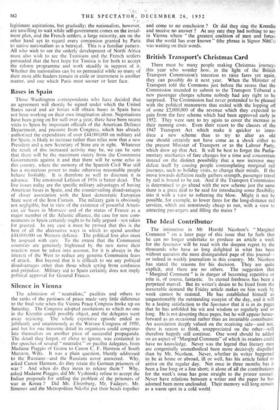Silence in Vienna
The admission of " neutralists," pacifists and others to the ranks of the partisans of peace made very little difference to the final vote when the Vienna Peace Congress broke up on Saturday. The Congress adopted resolutions to which no one in the Kremlin could possibly object, and the delegates went away rejoicing. The whole expensive episode ended as jubilantly and unanimously as the Warsaw Congress of 1950, and but for one tiresome detail its organisers could congratu- late themselves on another piece of successful propaganda. The detail they forgot, or chose to ignore, was contained in the speeches of several " neutralist " or pacifist delegates, from Madame Piaggio of Genoa to Canon C. F. Harmon of South Marston, Wilts. It was a plain question, bluntly addressed to the Russians—and the Russians never answered. Why, asked Canon Harmon, do they retain the German prisoners of war ? And when do they mean to release them ? Why, asked Madame Piaggio, did Mr. Vyshinsky refuse to accept the Indian proposals for settling the problem of the prisoners of war in Korea ? Did Mr. Ehrenburg, Mr. Fadayev, Mr. Simenov and the Metropolitan Nikolai put their heads together and come to no co,nclusion ? Or did they ring. the Kremlin and receive no answer ? At any rate they had nothing to say in Vienna where " the greatest coalition of men and forces that the world has ever known " (the phrase is Signor Nitti's) was waiting on their words.


























 Previous page
Previous page